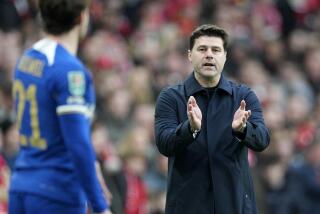Power shifts, coaching changes afoot in South American soccer
Gazing into the 2014 World Cup crystal ball, what do we see?
Well, for one thing, the fact that Argentina has blinked first — firing Sergio Batista as coach in a knee-jerk reaction to the team’s Copa America disappointment and then ludicrously denying the fact.
We see also that Brazil has decided to stand pat, opting to retain Mano Menezes as coach despite the fact that defending champion Brazil’s Copa America quarterfinal ouster was even more humiliating than host Argentina’s.
Finally, we see South America boasting a new 2014 favorite. Uruguay, under Coach Oscar Washington Tabarez, has parlayed a fourth-place finish at the South Africa 2010 World Cup into a first-place finish in the Copa America.
Spirits, therefore, are riding high in Montevideo these days, just as doom and gloom has descended on Buenos Aires and bewilderment engulfs Rio de Janeiro.
Just what heinous soccer crime “Checho” Batista is supposed to have committed is unclear, but within days of Argentina’s 5-4 loss on penalty kicks to eventual champion Uruguay after a 1-1 tie, the 48-year-old coach was sent packing.
It was Batista, brighter minds will recall, who won the World Cup as a resplendently bearded defensive midfielder with Argentina in 1986. It was Batista, too, who coached Argentina to the gold medal at the 2008 Beijing Olympics.
Yet, less than three months before qualifying starts for the Brazil 2014 World Cup and barely a year before the London 2012 Olympics, he has been cast aside.
Ernesto Bialo, an Argentine Football Assn. spokesman, insisted that Batista had not been fired but that it had been decided to “rescind” his contract.
Semantic nonsense, of course.
“Failure is a strong word,” Batista fired back at critics after Argentina’s Copa exit. “I wouldn’t call this failure. The balance wasn’t right, but that takes time and work.
“It never went through my head to resign. I signed my contract only five months ago, and I must keep working.”
Batista insisted that his goal was not immediate but long-term.
“I always said the Copa was all about getting ready for the World Cup in 2014,” he wrote in a letter to Argentina’s Clarin newspaper. “I recognize there were mistakes, and I am prepared to correct them. I am absolutely resolved to keep going.”
But the knives were out for Batista, and had been for some time despite the fact that he had beaten world champion Spain and archrival Brazil during his short time in charge.
Shortly before the Copa America, Batista’s predecessor, Diego “Handball” Maradona, had heaped pressure on his former teammate with a scornful remark typical of the 1986 World Cup cheat.
If Batista didn’t like the pressure, Maradona said, he should “cross the border to Uruguay, where nobody would recognize him.”
Bitter words from a man who was fired as Argentina’s coach after his team was thrashed by Germany in the 2010 World Cup quarterfinals. But then Maradona can say anything he likes, at least in the eyes of some.
“Diego, for all Argentines, is a god, and he always will be,” forward Carlos Tevez said earlier this year. It was Tevez’s missed penalty kick that sank Argentina and put Batista on the coaching scrapheap.
That fate did not befall Menezes, even though Brazil played for 120 minutes against Paraguay without scoring a goal and then, after the 0-0 tie, missed four consecutive penalty kicks (two high, one saved, one wide) while suffering its Copa quarterfinal exit.
Brazil’s O Globo newspaper summed the performance up in two perfectly chosen words. It was, the newspaper said, a demonstration of “historic incompetence.”
Still, Menezes, 49, survived.
“It’s important to keep our calm after a loss and avoid thinking that it was all negative,” he said.
Brazil’s immediate future includes an Aug. 10 match against Germany in Stuttgart in an encounter that could provide a preview of the 2014 World Cup final.
“We are at a stage where we are looking for reliable players,” Menezes said in a statement that beggars belief considering Brazil’s wealth of talent. Of course, reliability is another matter.
Whether Menezes will survive as coach until the next World Cup is problematic. He was not the first choice — that was Muricy Ramalho — and 2002 World Cup-winning coach Luiz Felipe Scolari also is lurking in the wings.
Brazil, as host, does not have to go through World Cup qualifying, so the next competitive matches the Selecao will play will be in the 2013 Confederations Cup, in Brazil.
Uruguay will be there, as South American champion. Some have pointed out that it was July 17 when Tabarez’s team shut out Paraguay, 3-0, in the Copa America final in Buenos Aires.
That date came exactly 61 years and one day after another historic Uruguay victory — over Brazil in the final of the 1950 World Cup in Rio de Janeiro.
Brazilians cannot stomach the prospect of history repeating, which is why Menezes will be looking over his shoulder, trying to escape the fate that befell Batista.
The bet here, though, is that Ramalho will be Brazil’s coach in 2014.
More to Read
Go beyond the scoreboard
Get the latest on L.A.'s teams in the daily Sports Report newsletter.
You may occasionally receive promotional content from the Los Angeles Times.










